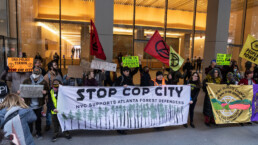The protests in Atlanta build on a history of organizers challenging prison construction as a force for environmental destruction.
by Amna A. Akbar, Dissent
On Saturday, March 4, I arrived at Intrenchment Creek Park in DeKalb County, Georgia, for the first day of a week of action against a $90 million construction project undertaken by the Atlanta Police Foundation—a private entity, backed by local CEOs and political leaders, that advances police interests. The foundation wants to raze eighty-five acres of public forest to build the largest police training facility in the United States, complete with a firing range, a burn building, and a “kill house” designed to mimic urban combat scenarios. It also argues that the facility will boost morale among officers. The size and scale of the project, and the destruction and deforestation it will require, have led a growing number of activists, organizers, and community members to object to what they call “Cop City.” The campaign against Cop City is simultaneously a campaign to defend the Weelaunee Forest, the name used for the area by the Muscogee Creek people forcibly displaced by settlers from the land in the early 1800s before it became the site of the notorious Atlanta Prison Farm. These elements of the campaign—the histories on which it draws, what it’s fighting against and for, who it is bringing together, and how—have given it tremendous staying power despite extraordinary odds.
Locals often describe Atlanta as “a city in a forest,” with trees and a tree canopy covering almost half of the land. The ecosystem depends on this foliage, and activists say that the deforestation required to build the facility will harm air quality, hasten climate change, and contribute to flooding in predominantly poor and working-class Black and brown communities. The proposed development will further distance residents from accessible green space while bringing toxic waste closer. But the project will do more than fracture the largest green space in Atlanta. The activists fighting against Cop City argue that police violence itself constitutes an environmental hazard, and that toxic chemicals associated with explosives that could be used on the site will destroy the air, water, and land on which myriad forms of life depend.

The week of action I attended was organized in remembrance of Tortuguita, or Manuel Esteban Paez Terán, the twenty-six-year-old nonbinary forest defender killed by Georgia State Patrol on January 18. Activists I met affectionately abbreviated their name to “Tort.” While police originally claimed self-defense, body-camera footage and two different autopsies show police shot Terán thirteen or fourteen times and suggest they were sitting cross-legged with both hands up when the police fired. Terán’s mother has since come to Atlanta from Panama to file suit against the city for records of her child’s murder, and to demand justice with a growing coalition at her side.
Recent Posts
A War With Iran Would Not Be a One-Off Event But a Disastrous Ongoing Rupture
February 26, 2026
Take Action Now If Congress cedes its power to stop a war with Iran, it will fully erode any lingering promise of democratic restraint.By Hanieh…
New Addition to List of Nuclear Near Catastrophes
February 25, 2026
Take Action Now Debris flew for great distances — many times the distance of 270 meters to a nuclear reactor and nuclear storage facility.By David…
Gavin Newsom’s last budget belies his ‘California for All’ pledge
February 24, 2026
Take Action Now Yet, even as the state is poised to lose billions in federal funding, and millions of Californians are losing access to health care…
Israel and American Hawks are Pushing U.S. to Iran War With Catastrophic Consequences
February 23, 2026
Take Action Now At the World Health Assembly in May, member states may endorse an unprecedented strategy declaring that health is not a cost – but…




